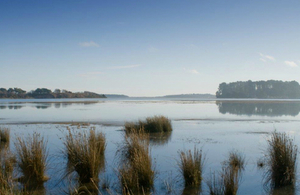Strengthened protection for Poole Harbour's unique range of wildlife
The extension of the Poole Harbour Site of Special Scientific Interest (SSSI) will see a further 1,800 hectares (ha) of land and sea brought within the site to help protect the entire harbour - an increase of 40 per cent.

Poole Harbour from Arne (Credit: Sue Macpherson ARPS)
One of the country’s best-loved coasts will be better protected following the expansion of a major wildlife protection area in Dorset.
Natural England has confirmed the extension of the Poole Harbour Site of Special Scientific Interest (SSSI). The move will see a further 1,800 hectares (ha) of land and sea brought within the site to help protect the entire harbour - an increase of 40 per cent. It is the first SSSI specifically to include subtidal areas, which will protect the feeding areas of internationally important tern populations.
The beautiful Poole Harbour is a magnet for both people and wildlife.
Environment Secretary, Michael Gove said:
Part of Thomas Hardy’s Wessex landscape, this protection of a large part of Poole Harbour will continue to ensure that generations to come can enjoy the Dorset coast. Through this action, Natural England is making a vital contribution to our nation’s cultural and environmental heritage.
Our 25 Year Environment Plan includes a commitment to develop a Nature Recovery Network to protect and restore wildlife. Improving our protected areas will play an important role as we develop this network and work to realise our ambition to become the first generation to leave the environment in a better state than we found it.
This SSSI extension connects to a wide network of important habitats. The Dorset Heaths are one of the best examples of lowland heath in the world and Poole Harbour opens out onto outstanding marine habitat protected under the Bluebelt programme, including Poole Rocks Marine Conservation Zone (MCZ), and Studland Bay proposed MCZ.
Key to the success of such large scale environmental improvement has been Natural England working with local harbour users and partners such as the Southern Inshore Fisheries Conservation Authority, Poole Harbour Commissioners, Royal Society for the Protection of Birds (RSPB), National Trust, Dorset Wildlife Trust, Dorset Area of Outstanding Natural Beauty and local authorities .
Natural England’s Interim Chief Executive, Marian Spain, said:
Natural England is here to make sure that people and nature can thrive, through sustainable stewardship of the land and sea. I am delighted therefore that we have been able to extend the protection for this internationally important site. Poole Harbour is one of the very few SSSIs to include important subtidal habitat, home to an abundance of species including dense forests of Peacock Worms.
The support from our partners and stakeholders across the area has been vital to our work and we look forward to continuing to work with them so that Poole Harbour can continue be enjoyed and cared for by everyone long into the future.
Dr Jane Goodall DBE, Bournemouth resident and founder of the Jane Goodall Institute and UN Messenger of Peace said:
I am delighted to learn that there has been a significant expansion of the wildlife protection designation which will help to safeguard the future health and resilience of Poole Harbour.
Protecting land and seas for future generations and for the welfare of all creatures depending on those areas is so important. I commend all involved for taking these steps to protect our precious environment for all.
A beloved habitat
Central to the area’s popularity is its unique natural environment, one which is loved locally and celebrated nationally and internationally. Fringing its shores are extensive saltmarshes and mudflats – these habitats provide vital feeding and breeding opportunities for the numerous rare and endangered bird species (eg, avocet, spoonbill & black-tailed godwit) for which the harbour is renowned.
These habitats also play an important role in providing tourism and recreational benefits, supporting a thriving commercial shellfish fishery and offering natural flood defence and cleaner water.
Below the waves, seagrass beds flourish in the shallows while the channels hide the spectacular peacock worm and a rich variety of other marine species including sponges, sea squirts and tube worms.
This designation will complement the existing management measures, including the newly extended Poole Harbour Special Protection Area that was announced last year, to deliver a management framework for all stakeholders.
Further reaction from conservationists
Conservation organisations working in the harbour area are supportive of the move to expand the protections for this important habitat.
Paul Morton, co-founder of the charity ‘Birds of Poole Harbour said:
The SSSI extension follows the recent SPA review and is in recognition of the importance the whole harbour has to waders and wildfowl. Natural England deserve a huge well done for bringing this together, as do all the organisations that helped collate the relevant data.
Emma Rance, marine conservation officer at Dorset Wildlife Trust said:
The channels beneath the busy waterways of Poole Harbour are home to a myriad of species. Supporting habitats such as seagrass beds provide refuge for juvenile fish and shellfish which become a rich food source for overwintering and roosting seabirds. We very much welcome the SSSI extension to further enhance the conservation value of our highly prized harbour.
Andy Smith, Natural England’s Area Manager for Hampshire, Dorset and the Isle of Wight said:
Poole Harbour is a special place. This extension of the area’s protection is about supporting sustainable social and economic development in a way the benefits and enhances the natural environment. By identifying, designating and managing important species and habitats, we can ensure development compliments and supports these local features.
While Natural England has led on this new designation, this achievement is thanks to the hard work and support of many key Poole Harbour conservation organisations. This strong partnership has been developed and will continue in the coming months to ensure the opportunities associated with this new protection are fully realised.